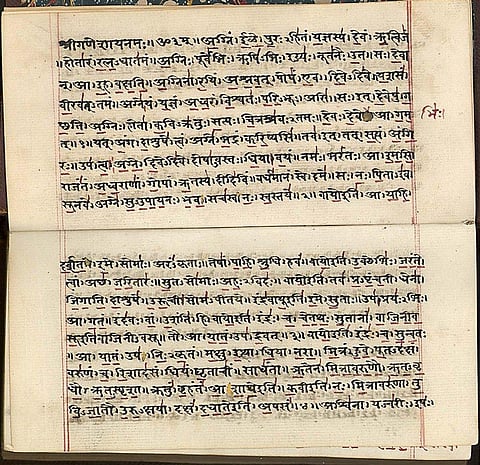
- Home
- न्यूजग्राम
- NewsGram USA
- India
- World
- Politics
- Entertainment
- Culture
- Lifestyle
- Economy
- Sports
- Sp. Coverage
- Misc.
- NewsGram Exclusive
- Jobs / Internships

By Nithin Sridhar
Gleanings from Hindu Scriptures – Part 9
The previous installment of the series dealt with how daya/compassion and love should be shown towards everyone. Another tenet of dharma (duty/righteousness) that is intimately connected to compassion is "kshama" or forgiveness.
Forgiving is generally understood as forgiving someone for some action that may have offended us. At times, this forgiveness may have been imposed on us due to various factors. The general understanding of forgiveness is that one gives up any grudges that he/she holds against another person. And even this may not always be the case.
A person may not truly give up grudges against another, even after he or she might have rendered forgiveness. Often, the grudges and the frustrations stay as bitter memories in the subconscious mind.
As a result, many people are prone to anger, insecurity, hatred, and other such negative emotions. This in turn prevents them practice compassion towards everyone. Therefore, it becomes crucial to understand what forgiveness means and how to practice it. Shandilya Upanishad (1.1) says:
kshamA nAma priyApriyEshu sarvEshu tADanapUjayEShu sahanam!
Translation: The forbearance of pleasant and the unpleasant, the praise as well as the abuse is termed as "Kshama"
Therefore, Kshama is just not just about forgiving someone for their mistakes or offenses. It is about handling the good and the bad, the sorrow and the happiness in a patient and self-restrained manner.
The human nature is such that, people love getting praised. They always look forward to get appreciated by others. It may be a student looking for the teacher's appreciation, or an employee expecting good words from his boss. The same is the case with a wife expecting a compliment about her beauty from her husband.
On the other hand, people cannot tolerate even mild criticism. People's anger will burst out if anybody criticizes them openly. An insult or verbal abuse may lead to a physical fight as well.
The fact of the matter is, people find it hard to control their own thoughts and emotions. A famous quote attributed to Buddha says it is better to conquer yourself than to win a thousand wars. And the key to conquer one's own mind is in practicing Kshama.
The happy memories linger in the mind for a shorter duration compared to bitter memories that can linger for years and years. Kshama means removing those bitter memories from their very roots.
This uprooting of grudges even from the sub-conscious level is truly possible, when one realizes that the happiness or sorrow, the praise or the insult one faces in life are nothing but fruits of one's own past actions- actions that were committed over many lives.
Therefore, there is no meaning in blaming other's for one's own fall and suffering. Hence, one should forgive the other person for his faults. One should forgive even those who try to harm us.
Kshama is the key to unburden the mind from the burdens like frustration, hate, anger, and enmity. Let Kshama not be misunderstood as a sign of weakness, instead it is a sign of strength.
Once, a person realizes that he or she is the master of his/her own destiny, the person will stop getting affected by what others say or do. The praise or criticism will cease to be a burden on the mind. Instead, such a person will take criticism constructively and act upon it if he finds any merit in it.
Further, forgiving someone does not mean turning a blind eye towards his actions or pacifism. Instead, only a person endowed with Kshama can truly act in a righteous and dharmic manner. Therefore, the practice of Kshama is very vital for practicing dharma and the key to this practice is development of equal-sightedness- perceiving every person and their actions on the basis of merit and not prejudice; and not letting any of those affect the mind or the decisions.
